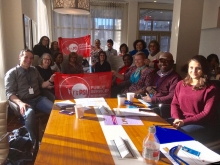PSI statement on UNCSW62

PSI STATEMENT ON THE 62ND SESSION OF THE UNITED NATIONS COMMISSION ON THE STATUS OF WOMEN
CSW62 came to an end with governments developing a set of Agreed Conclusions that fail to address the major threats facing rural women yet can be considered a defensive achievement in a global climate of regressive, patriarchal attacks on women’s human rights. When governments last addressed the theme of rural women’s rights in 2012, they failed to reach an agreed outcome, which in turn makes this year’s conclusions appear an achievement, despite the reductive result.
Trade unions and feminist organizations made various proposals and lobbied for transformative policy concepts prior to and during the negotiations. While feminist groups felt that much was achieved in relation to sexual and reproductive rights, in spite of the global backlash and presence of deeply conservative forces, much less was achieved in relation to economic rights, including labour rights. The UN expert group report, developed to inform the CSW, recommended addressing the structural barriers created by neoliberal economic policies, including trade agreements, corporate power, privatization, land-grabbing, tax evasion and avoidance and climate change. These were either deleted or dealt with in a cursory, reductive manner.
Some of the key outcomes covered in the agreed conclusions include:
- Recognition of trade unions as contributors and relevant stakeholders in achieving gender equality and the empowerment of women and girls living in rural areas;
- Inclusion of the decent work agenda as critical to the empowerment or women in rural areas, making clear reference to the International Labour Organization Declaration on Fundamental Principles and Rights at Work. Recognition of rights to freedom of association, peaceful assembly and collective bargaining, yet specific mention of migrant workers’ right to work and rights at work were deleted from the final text; as were references to other specific groups of women workers;
- Last year CSW made a breakthrough in recognizing the importance of a gender equitable just transition in the context of climate change. We were disappointed that governments failed to include the need for a just and equitable transition of rural economies and workforce given the huge impact climate change has on women living in rural areas;
- The importance of financing for health services was included but the language chosen didn’t go as far as the commitment in the 2030 Agenda which requires states to “substantially increase health financing and the recruitment, development, training and retention of the health workforce”;
- We were very disappointed that proposed language specifically addressing community health workers was deleted in the final agreed conclusions. We need to work out which governments might lobby for that language next year and make it a priority;
- Governments took a narrow and harmful view of equal pay allowing them to choose between equal pay for equal work or equal pay for work of equal value. ILO C100 clearly supports the broader concept. The main causes for the gender pay gap come from the historical sexual division of labour and the subsequent undervaluing of traditional women´s work.
- While there are references to the lack of access to public services in the text, there are too many mentions of key services without making reference to the public provision of these services. Public infrastructure, public water and sanitation, public energy, public education, public child care and public care are not specified. Where public health is mentioned, it relates to policies and not services. Private sector, on the other hand, is given attention and the idea of “reinvigorating” the Global Partnership for Sustainable Development (often code for private sector partnerships) was highlighted at the last minute.
- PSI is certain that rural women’s human rights and the implementation of the 2030 Agenda will only be possible if we commit to gender responsive public service. Each of these components made it into to the text but never together. Amongst those included were: mainstreaming a gender perspective in decision-making processes and the management of natural resources, strategies for adaptation and mitigation of climate change; gender responsive economic and social policies; invest in provision of and access to quality, resilient and gender responsive modern energy, and safe drinking water and sanitation for all.
- In addressing the mobilization of financial resources for rural women’s rights, there is a strong message on the need for modernized, progressive tax systems, improved tax policy and more efficient tax collection. While there was reference to combating illicit financial flows, governments failed to address tax evasion and avoidance: tax havens and secrecy jurisdictions, trade mispricing, tax competition and illusory corporate structures.
Reflecting on both the outcomes and the process of CSW62 will help PSI and affiliates prepare for next year’s important negotiations focused on “Social protection systems, access to public services and sustainable infrastructure for gender equality and the empowerment of women and girls”.

